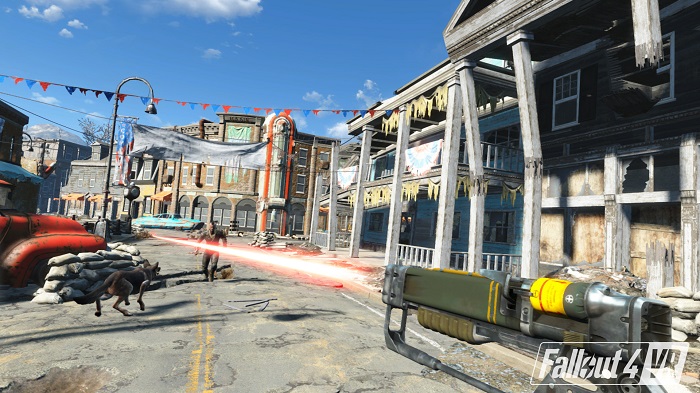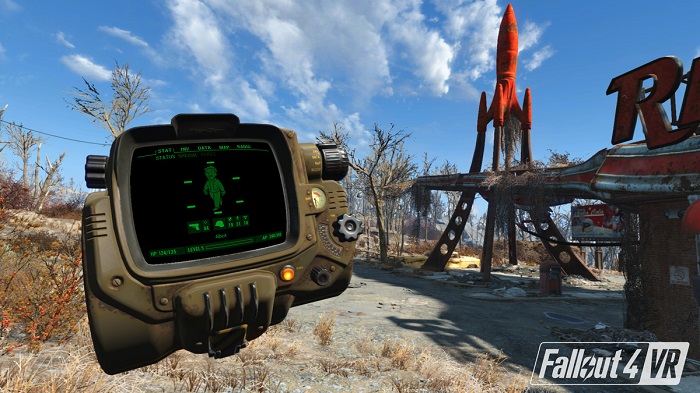Fallout 4 VR PC Bringing the Wasteland to Life in Virtual Reality
Fallout 4 VR PC is the name of the virtual reality version of Bethesda Game Studios’ post-apocalyptic role-playing game Fallout 4 VR PC, which Bethesda Softworks published. It was released for PC on December 12, 2017, allowing players to experience the entire Fallout 4 game world in VR.
Fallout 4 VR PC takes place in Boston, Massachusetts, in the year 2287, over 200 years after a nuclear war between the United States and China left the world devastated. You play as the Sole Survivor, emerging from Vault 111 into the Wasteland, searching for your kidnapped son Shaun. Boston is now called The Commonwealth, filled with super mutants, ghouls, raiders, and various factions struggling to survive.
Gameplay in Fallout 4 VR Mods is similar to the original Fallout 4 but optimized for VR. You can explore the open world from a first-person perspective, interacting with characters, completing quests, customizing weapons and armor, building settlements, and engaging in combat using motion controllers. VATS returns, allowing you to target enemies in slow motion for more precision. Crafting, hacking, lockpicking, and dialogue choices are all done physically in VR for greater immersion.
The full Fallout 4 story and its DLC expansions are included in VR. Key features include hundreds of locations to visit, dynamic weather systems, day/night cycles, companion characters like Dogmeat, and the ability to play in VR from start to finish. Fallout 4 VR PC Mods work with Oculus takes the massive Wasteland and adds an extra layer of immersion only possible with virtual reality.
Gameplay Story Of Fallout 4 VR PC
The game begins in 2077 on the day of the nuclear war. You play as the Sole Survivor and are rushed to Vault 111 with your family and others to seek shelter. So, You are put into cryogenic stasis but soon get released, only to see your spouse killed and baby Shaun kidnapped.
You emerge from the vault over 200 years later in 2287 into the Wasteland called The Commonwealth. Using the wrist-mounted Pip-Boy, you can check stats, maps, items, and quests. Early objectives are to find companions like Dogmeat and explore the nearby town of Concord while defending yourself from ghouls and raiders using found weapons and armor.
Groups including the Brotherhood of Steel, Institute, Railroad, Minutemen, and Brotherhood of Steel are battling Fallout 4 VR PC Mods out for dominance as you explore. You can choose to help or hurt them, which changes how the major story goes. You can customize weapons and armor, build villages, hack terminals, pick locks, make things, and explore dungeons as side activities.

Main story quests involve searching for clues about your missing son, Shaun. This led to eventually discovering The Institute took him to become their Director. You must infiltrate their secret underground base and confront Shaun, choosing to side with him and the Institute or turn against them. Multiple endings are possible, depending on your choices.
In VR, you experience all this from a first-person immersive perspective using motion controllers. Battling raiders, conversing with characters, lockpicking and hacking, exploring the Wasteland, and making moral choices are all done physically for greater engagement. Fallout 4 VR mod support brings the vast Commonwealth to life in a new way.
Characters and their Roles in the Game Fallout 4 VR PC
- Sole Survivor: The playable protagonist. You customize their appearance and can play as either male or female. Emerges from cryogenic stasis in Vault 111 to search for their kidnapped son, Shaun.
- Shaun: The Sole Survivor’s infant son who is kidnapped in the opening moments. Growing up isolated in the Institute, he later becomes the Director. A key character in the main story.
- Dogmeat: A loyal German Shepherd you can recruit as a companion early on. Helps track enemies, finds items, and can be petted and played with in VR.
- Preston Garvey: Leader of the Commonwealth Minutemen faction. Joins you as a companion and helps establish settlements. Provides quests to assist civilians throughout the Wasteland.
- Piper Wright: An intrepid reporter living in Diamond City. Can join you on journeys as a companion while she gathers stories for her newspaper.
- Nick Valentine: A synth detective assisting cases in Diamond City. Can be recruited to help search for Shaun and has his own story quests to complete.
- Father: The mysterious Director of the secretive Institute. His true identity and motives are revealed throughout the main story. A key character.
- Desdemona: Leader of the Railroad, a faction dedicated to freeing synths from the Institute. She provides quests in support of the Railroad’s cause in the region.
- Elder Maxson: Young leader of the East Coast Brotherhood of Steel chapter. He commands the Prydwen airship and fights to acquire advanced technology from threats like the Institute.

Popular Mods that Enhance the Experience of Playing Fallout 4 VR PC
- Graphics Mods: For improved visuals, mods like Vivid Fallout 4 VR essential mods, Darker Nights, and High-Resolution Texture Pack overhaul textures, lighting, weather, landscapes, and more.
- Immersion Mods: Make the VR world more realistic with mods like Idle Hands, which gives your character visible body and hands, and Grab Anything, allowing you to physically pick up and handle objects.
- Quality of Life Mods: QuickTrade, QuickLoot, and Faster Terminal Displays improve UI interactions and streamline gameplay mechanics for less redundancy.
- Settlement Mods: Expand settlement building with mods like SSEx and CVRE. Add new structures, furniture, decorations, crafting stations, and estate management features.
- Combat Mods: Mods like Bullet Time, Locational Damage, and Gore Overhaul provide new tactical options in combat and make fights more visceral.
- Weapon Mods: Get new weapons like lightsabers and customizable optics, attachments, skins, animations, effects, and sounds through mods.
- Quest Mods: New story content like Tales from the Commonwealth, The Machine and Her, and Depravity add dozens of new VR quests.
- Companion Mods: Mods like Heather Casdin and Ellen add fully voiced new companions with quests and romance options.
- Performance Mods: Mods like VR Optimization Project and Insignificant Object Remover free up resources and boost FPS.

Updates That Have Been Released For Fallout 4 VR PC
The initial launch update in December 2017 added basic VR optimization and bug fixes. This included headset-specific adjustments and stability improvements.
This major update focused on graphics enhancements and gameplay fixes. It included lighting improvements, reduced aliasing, better reflections, and visual tweaks to make the VR world more crisp and realistic. Gameplay fixes adjusted crafting, loot, and combat balance.
Further graphics enhancements, such as enhanced LOD pop-in and draw distances for clearer long-distance views, were added. Support was added for new VR controllers like the Valve Knuckles. More gameplay fixes targeted QOL improvements.
An update added a slider to adjust height offset so players could fine-tune their view. Other tweaks were made to companion commands and crafting menus to make interactions more intuitive in the Fallout 4 VR mod list.
A range of bug fixes were implemented for quests, NPC conversations, controls, UI, and scopes/sights. The texture budget was optimized to improve stability. Weather effects were also enhanced.
One of the biggest updates added official mod support through the Creation Club, opening up hundreds of new mods. The update also introduced a quick loot system, scope zoom, and other VR-friendly mechanics.

Minimum System Requirements to Play Fallout 4 VR PC
- OS: Windows 10
- CPU: Intel Core i5-4590 or AMD FX 8350
- GPU: Nvidia GeForce GTX 1070 or AMD Radeon RX Vega 56 with 8GB VRAM
- RAM: 8 GB
- Hard Drive Space: 30 GB
- VR Headset: HTC Vive, Oculus Rift, or Valve Index with compatible motion controllers
- Ports: HDMI 1.4, USB 2.0
